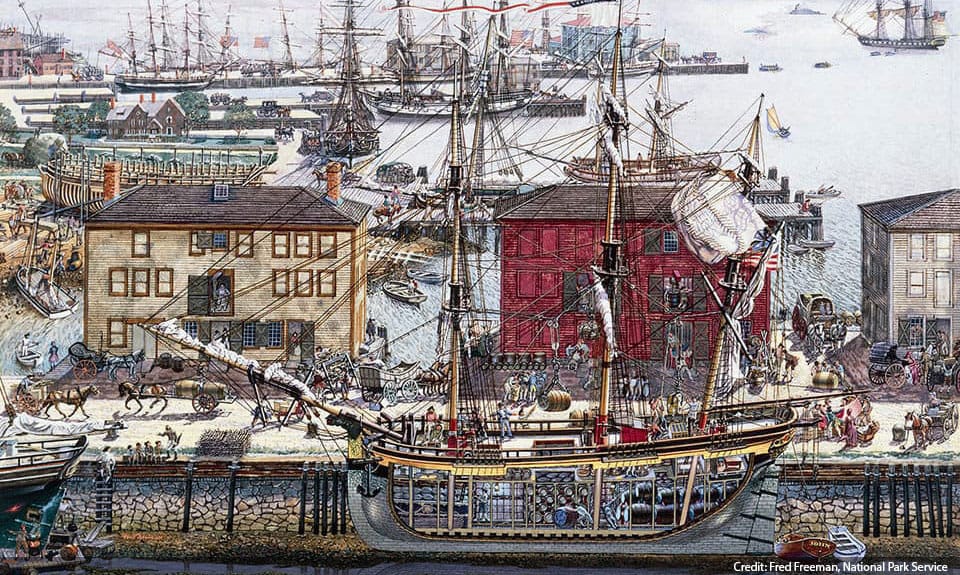Common Phrases with a Nautical Origin
Many phrases that we use today originate from maritime culture. The 10 phrases described below are just a few.

This illustration by Fred Freeman depicts Derby Wharf in Salem, Massachusetts, in the late 1800s. Many nautical terms derive from the Age of Sail—the period of time between the 16th and 19th centuries when masted ships ruled the seas.
1. Long Shot
An occurrence that would take a great deal of luck.
Early ships’ guns tended to be inaccurate. If a shot made impact from a great distance, or a “long shot,” it was considered out of the ordinary.
2. Flotsam and Jetsam
Odds and ends.
While the words flotsam and jetsam are often used together, they have different meanings. "Flotsam" (from the word "float") describes items that weren't deliberately thrown overboard, while "jetsam" (from the word "jettison") describes items that were deliberately thrown overboard.
3. Tide Over
Make a small amount last until a larger amount is available.
Not to be confused with "tied over," this phrase has its origins in seafaring. When there was no wind to fill the sails, sailors would float with the tide until the wind returned. They would "tide over."
4. Feeling Blue
Experiencing feelings of sadness or melancholy.
If a captain or officer of a ship died while at sea, the crew would fly blue flags and paint a blue band along the ship’s hull. Over time, this symbol of grieving was equated with feeling sad or melancholy.
5. Taken Aback
Startled or surprised.
The sails of a ship were described as “aback” when the wind blew them flat, or back, against their supporting structures.
6. The Cut of His/Her Jib
A person's general appearance.
A jib is a type of sail. At one time countries would display their own unique jibs, allowing outsiders to instantly know the ship’s origin, and form an impression of it by the cut of its jib.
7. Pipe Down
A request or command to be quiet.
Ship crews received a variety of signals from the boatswain’s pipe. One signal was “piping down the hammocks,” which instructed the crew to go below decks and prepare for sleep.
8. Toe the Line
To conform to the policies of a group.
Members of the British Royal Navy were required to stand barefoot and at attention for inspection. While at attention they lined up along the seams of the planks of the deck with their toes touching the line. This became known as "toeing" the line.
9. Take the Con
To take control of.
To take over, or control, the navigational duties on the bridge of a ship.
10. In the Doldrums
Depressed or listless.
The "doldrums" refers to the belt around the Earth near the equator. Because there is often little surface wind for ships' sails to use in this geographic location, sailing ships got stuck on its windless waters. Over time, people equated the calmness of the doldrums with being listless or depressed.
Search Our Posts
Get Social
More Information
Did You Know?
Nautical terms are peppered throughout modern-day English. But did you know that there is an entire language devoted exclusively to sea navigation? It’s called Seaspeak, and it’s used to facilitate clear communication on the seas, regardless of the navigator’s native tongue.
